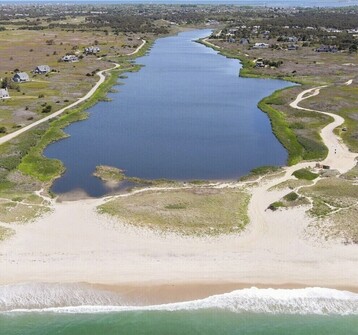Governor's Proposed Bill Could Grant State Ownership Over Select Barrier Beaches
JohnCarl McGrady •

A provision in a bill proposed by Governor Maura Healey would give the state ownership over barrier beaches that move below the low water line of a great pond in Massachusetts, reversing centuries of legal precedent in a move intended to increase public access to the state’s beaches. The ruling could affect Nantucket’s seven great ponds, though most are already publicly accessible via land owned by local conservation groups.
The provision has generated some controversy, with opponents claiming it is intended to appease one of Healey’s wealthy donors, who has been in a lengthy legal battle over access to a barrier beach near his home on Martha’s Vineyard, and could expose the state to lawsuits from unsatisfied property owners who believe it constitutes a taking of private property.
“In areas where natural processes, with or without human intervention, have caused the landward or lateral movement of a barrier beach into an area below the historic low water line of any great pond, the portion of the barrier beach relocated into the former bottom of the great pond shall be and remain in Commonwealth ownership in perpetuity,” the provision reads in part.
Part of Healey’s environmental bond bill, the provision is similar to bills that have been proposed in the legislature before, including one sponsored by Senator Julian Cyr, who represents the Cape and Islands. So far, none of those bills have become law, but Healey’s support may make this effort harder to defeat.
As it stands under Massachusetts law, property lines generally shift with erosion, following the low tide line, though the public can pass between the low and high tide lines for purposes of fishing, fowling and navigation. Healey’s bill would change that.
Nantucket has seven great ponds: Hummock Pond, Long Pond, Miacomet Pond, Sesachacha Pond, Coskata Pond, Gibbs Pond and Tom Nevers Pond. However, most of them can already be reached using publicly accessible trails owned by local conservation organizations including the Nantucket Conservation Foundation, the Nantucket Land Bank, and Mass Audubon.
Proponents say that the provision is an important step toward expanding access to beaches and note that Massachusetts has some of the strictest laws governing beach access in the country.
“This provision, which is similar to one previously proposed and advanced by the Legislature, is about making sure that everyone has access to great ponds and barrier beaches across the state,” Karissa Hand, a spokesperson for Healey, said in a statement reported by the Martha’s Vineyard Times and the Martha’s Vineyard Gazette.
But opponents say that Healey is caving to pressure from a powerful donor, making the state vulnerable to expensive lawsuits in the process.
The donor in question is Richard Friedman, a real estate developer who owns a home on Oyster Pond, a great pond located in Edgartown, Martha’s Vineyard. The Martha’s Vineyard Times reported that Friedman initially claimed ownership over a stretch of beach on the pond’s shore before changing tactics and arguing that the beach was actually public property. His legal efforts have been unsuccessful, but his legislative efforts may bear more fruit.
“Despite efforts by some to suggest otherwise, the proposed language in this section of the bill is not a matter of public policy. Rather, it is born out of the efforts of a single individual to circumvent numerous losses in the Massachusetts Land Court,” Brad Keeler, a member of the Pohogonot Trust on Martha’s Vineyard, which has fought on the other side of Friedman’s legal battle, said. “This bill will have the unintended consequence of forcing the Commonwealth to defend countless lawsuits at a cost of hundreds of millions of dollars at a time when the state has so many other needs to support the well-being of its citizens, like the other more worthy provisions in this bill.”
The full environmental bond bill was heard at the Joint Committee on Environment and Natural Resources on July 15th.
On Nantucket, the provision has yet to garner much attention. Multiple employees of conservation organizations that own land abutting great ponds on Nantucket said they haven’t heard of it.